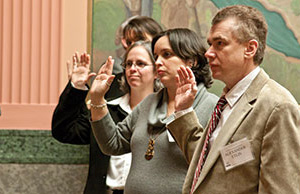Interpreter Resource Available to Courts

Some of the first court interpreters certified in Ohio take their oaths during a 2011 ceremony at the Thomas J. Moyer Ohio Judicial Center.

Some of the first court interpreters certified in Ohio take their oaths during a 2011 ceremony at the Thomas J. Moyer Ohio Judicial Center.
To assist Ohio courts with their new obligation under Sup.R. 88 to hire a certified interpreter when available, the Ohio Supreme Court has made available on its website a roster of interpreters certified in American Sign and foreign languages.
Organized by geographic region, the list includes court interpreters based in Ohio and elsewhere but available for work here, and also lists those individuals who are provisionally certified in a foreign language and those who are ASL qualified interpreters. Using certified interpreters enables courts to provide the most qualified individuals without having to guess at their qualifications.
The Supreme Court adopted the rule in June 2011, but decided to delay it to allow courts sufficient time to prepare. The rule, which goes into effect January 1, is designed to help ensure the meaningful participation of deaf and limited English-proficient parties in court proceedings. The rule also requires courts to use “all reasonable efforts” to avoid appointing an interpreter who may have a conflict of interest.
The Supreme Court began certifying court interpreters in 2010, honoring 23 during the first ceremony of its kind on February 1, 2011, at the Thomas J. Moyer Ohio Judicial Center.
Ohio courts accommodate about 80 foreign languages annually. The current roster includes 90 interpreters certified in six languages that mirror the focus of the initial phases of the certification process: Arabic, Russian, Spanish, French, Mandarin, and Somali.
Bruno Romero, manager of the Supreme Court Interpreter Services Program, said certification testing is ongoing in 20 additional languages. “We will continue to offer training and certification every year until we reach an optimum point in the supply and demand of court interpreters,” he said.
The October edition of CNO Review covered the new rule change in depth.
Acrobat Reader is a trademark of Adobe Systems Incorporated.


